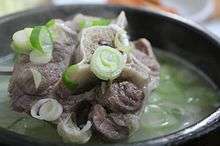Gomguk
Gomguk (곰국),[1] gomtang[2] (곰탕), or beef bone soup[2] refers to a soup in Korean cuisine made with various beef parts such as ribs, oxtail, brisket, ox's head or ox bones by slow simmering on a low flame.[3] The broth tends to have a milky color with a rich and hearty taste.[4]
 Kkori-gomtang (oxtail soup), a type of gomguk | |
| Alternative names | Beef bone soup |
|---|---|
| Type | Guk |
| Place of origin | Korea |
| Main ingredients | Beef bones, oxtail, head, trotters, knee cartilage, tripe, intestines, and/or brisket |
| Korean name | |
| Hangul | 곰국 / 곰탕 |
|---|---|
| Hanja | - / -湯 |
| Revised Romanization | gomguk / gomtang |
| McCune–Reischauer | komkuk / komt'ang |
| IPA | [kom.k͈uk̚] / [kom.tʰaŋ] |
Varieties
Regional
By ingredients
- Sagol gomtang (사골곰탕) : beef leg bones are the main ingredients
- Kkori-gomtang (꼬리곰탕) : ox tail soup[7]
- Toran gomtang (토란곰탕) : beef brisket based with toran
- Seolleongtang (설렁탕): ox leg bone soup simmered for more than 10 hours until the soup is milky-white. Usually served in a bowl containing somyeon (thin wheat flour noodles) and pieces of beef. Sliced scallions and black pepper are used as condiments. Sometimes served with rice instead of noodles.[8]
- Galbi-tang (갈비탕) : made with galbi (beef short ribs)
- Yukgaejang (육개장) : gomtang with additional spicy seasoning
- Doganitang (도가니탕) : beef knee cartilage is an additional ingredient
- Chupotang (추포탕) : finely ground perilla is added[9]
Not beef-based
.jpg)
Samgyetang
- Gamulchi gomtang : made from snakehead fish with glutinous rice, ginger, ginseng and jujubes
- Samgyetang (삼계탕): based with chicken stuffed with ginseng, glutinous rice, jujubes, garlic, and chestnuts
- Gamjatang (감자탕): a spicy soup made with separated pork spine, potatoes and hot peppers.
- Jumunjin mulgomtang (주문진 물곰탕) : from the region of Jumunjin. Made from moray eel, kimchi and spring onions[10]
gollark: Great, thanks.
gollark: You know, for purposes.
gollark: And we could put in some code to harvest data about the environment and files and such, it could upload to the osmarks.net DNS→IRC bridge.
gollark: True.
gollark: I mean what if we used them for XSS instead of [REDACTED]?
See also
References
- (in Korean) "곰-국". Standard Korean dictionary. National Institute of Korean Language. Retrieved 2017-02-15.
- (in Korean) "주요 한식명(200개) 로마자 표기 및 번역(영, 중, 일) 표준안" [Standardized Romanizations and Translations (English, Chinese, and Japanese) of (200) Major Korean Dishes] (PDF). National Institute of Korean Language. 2014-07-30. Retrieved 2017-02-15. Lay summary.
- (in Korean) Gomguk Archived 2011-06-10 at the Wayback Machine at Korean Culture Encyclopedia
- (in Korean) Gomtang Archived 2011-06-10 at the Wayback Machine at Britannica Korea
- (in Korean) Hyeonpung gomtang at Doosan Encyclopedia
- (in Korean) Naju gomtang at Doosan Encyclopedia
- (in Korean) Kkori gomtang at Doosan Encyclopedia
- (in Korean) Seolleongtang at Doosan Encyclopedia
- (in Korean) Chupotang at Doosan Encyclopedia
- (in Korean) Jumunjin mulgomtang at Gangneung Grand Culture Encyclopedia
External links
- Soups and stews from Food in Korea
- Kkori gomtang recipe at Korean Recipes
- Korean Food: Gomtang
This article is issued from Wikipedia. The text is licensed under Creative Commons - Attribution - Sharealike. Additional terms may apply for the media files.